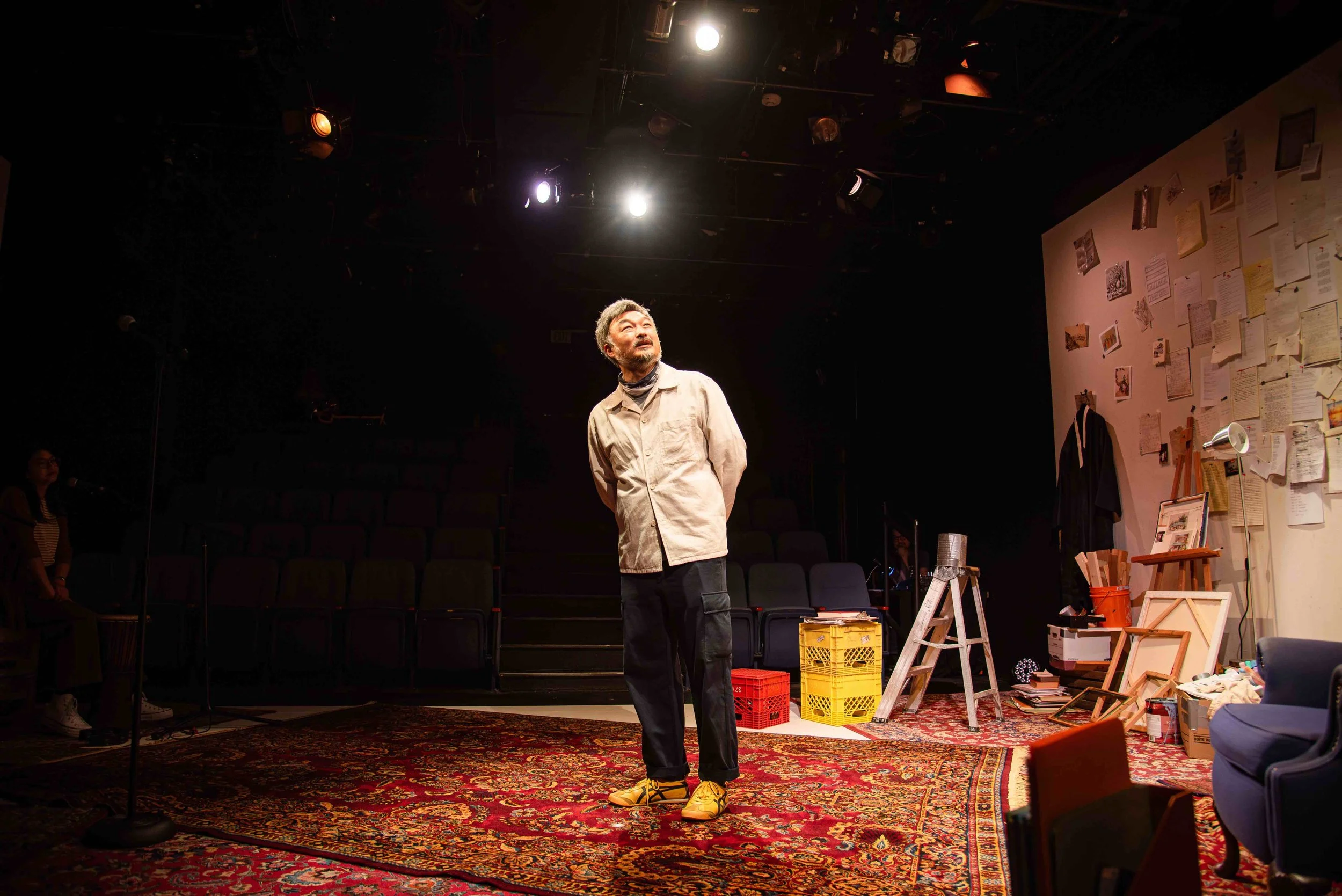Theatre review: Grandma. Gangsta. Guerrilla. dives into wild mix of immigrant dramedy, wartime recollection, and musical interludes
Cast finds both humour and heart in Ruby Slippers premiere by playwright Abi Padilla
Terrence Zhou, Yorlene Bernido, and Abi Padilla in Grandma. Gangsta. Guerrilla. Photo by Moonrider Productions
Ruby Slippers Theatre and Blackout Art Society presented Grandma. Gangsta. Guerrilla at the Shadbolt Centre for the Arts until February 8. It continues at Presentation House Theatre from February 13 to 15
GRANDMA. GANGSTA. GUERRILLA. IS A LOT of things at once—an ambitious but grounded debut from playwright Abi Padilla, a play that navigates historical trauma and familial dysfunction, and a work that finds humour and heart in the treacherous terrain of both.
A fast-moving mix of wartime recollection, immigrant dramedy, and musical interludes, the Ruby Slippers Theatre premiere (in association with Blackout Art Society, the Shadbolt Centre, and Presentation House Theatre) still keeps its tender moments at its core.
In the middle of it all is the stubborn, feisty, and limber Lola Basyang. When she escapes her care home, her grandchildren, Nika and Jun-Jun, are left scrambling to track her down. Their only clues come from her journal—more like an unfinished memoir addressed to the two grandchildren she raised in Canada—detailing her youth in the Philippines during World War II.
When we first meet Basyang, she tells us she has “the memory disease”, her way of describing dementia. Her memories come back, crashing in, triggered by random things, phrases, or even her granddaughter’s Japanese boyfriend. One second she’s fully lucid, the next she’s somewhere else, convinced events from her past are happening in real time all over again. But even as her mind plays tricks on her, she’s not the type to sit back or dwell. If she thinks she’s in danger, she reacts, sometimes a little too aggressively. That’s how something as simple as taking her meds turns into a Mortal Kombat showdown with her care-home nurse. The play runs with the idea, turning her confusion into comedic moments as well as weightier flashbacks. Past and present trip over each other, creating a kind of chaos that’s revealing, sometimes funny and sometimes more gut-wrenching.
Padilla’s take on Lola, both in writing and performance, makes the setup work. She plays the elder as almost indestructible, her strength unrivalled in the fight scenes that pop up throughout the play. The character also still feels real—wrapped in a little cardigan, pink slippers, and occasionally grabbing whatever household item is nearby to use as a weapon. The humour feels lived-in, like when she mistakes Nika for her favorite telenovela actress or tosses out quips to anyone in earshot, the way only a grandma can. Jokes in Tagalog come and go without explanation, landing naturally and sustaining the humour and helping make the family dynamics feel grounded.
Not everything lands equally well. The “gangsta” subplot—well-meaning but ultimately misguided Jun-Jun’s run-in with a gorilla-themed gang—leans a little too hard into absurdity at times, making it feel more like a pun (guerrilla/gorilla) than anything else. This stands out most during a musical number that flashes back to Lola at 14, just after the Japanese invasion, when she’s forced to join the Hukbalahap resistance fighters. At the same time, in the present, Jun-Jun is being pressured to join the gang, setting up a clear parallel between the two. There’s something interesting in the way the play draws this connection, perhaps hinting at colonialism’s lingering grip across generations, but the execution doesn’t carry the emotional weight that it reaches for, and attains, in other parts of the play.
There is solid emotional footing in the sibling dynamic, however. As much as Grandma. Gangsta. Guerrilla. is about Lola, it’s just as much about Nika (a sharp, no-nonsense Yorlene Bernido) and Jun-Jun (played as a lovable but self-conscious slacker by Vince Sendrijas), and how their grandmother’s condition (which is really just a metaphor for her trauma) ricochets through the family. Their relationship swings between biting humour and vulnerability, shifting as they figure out how to best care for her and each other. Nika, in particular, reminds us what it means to carry the weight of obligation. The love is there, but so is the exhaustion.
The production moves fast, with breaking-news interludes weaving together Philippine history and the Vancouver gang subplot. Even the simple set feels restless, while Jonathan Kim’s lighting design and Andie Lloyd’s historical projections enhance the play’s sense of shifting memory. The musical numbers are full of energy, as is the entire cast. At times—especially during the historical flashbacks—the scale of the show feels like it’s pushing its own limits, but that ambition isn’t necessarily a bad thing.
The play takes big swings. More than anything, it is loud, funny, and full of heart, anchored by a family dynamic that feels real in all its chaos. In its complex simplicity, Grandma. Gangsta. Guerrilla. poignantly reminds us that if trauma is passed down, so is resilience. ![]()


































